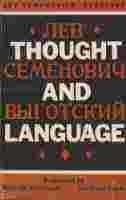Published by MIT Press, 1972, softcover, index, 168 pages, underlining, overall condition: good. Since it was introduced to the English-speaking world in 1962, Lev Vygotsky's highly original exploration of human mental development has become recognized as a classic foundational work of cognitive science. Vygotsky analyzes the relationship between words and consciousness, arguing that speech is social in its origins and that only as children develop does it become internalized verbal thought. Now Alex Kozulin has created a new edition of the original MIT Press translation by Eugenia Hanfmann and Gertrude Vakar that restores the work's complete text and adds materials that will help readers better understand Vygotsky's meaning and intentions. Kozulin has also contributed an introductory essay that offers new insight into the author's life, intellectual milieu, and research methods. Lev S. Vygotsky (1896-1934) studied at Moscow University and acquired in his brief lifespan a nearly encyclopedic knowledge of the social sciences, psychology, philosophy, linguistics, literature, and the arts. He began his systematic work in psychology at the age of 28, and within a few years formulated his theory of the development of specifically human higher mental functions. He died of tuberculosis ten years later, and Thought and Language was published posthumously in 1934.
What an extraordinary person Vygotsky must have been. Here he is, in his late 30s, dying of TB and stuck in a Stalinist Russia that doesn't much appreciate him, and he still takes the trouble to write this little book which tries to summarise his unique approach to psychology. He puts Piaget in his place as politely and firmly as Weyl, another underappreciated contemporary, does with Russell. The edition I'm reading has long footnotes from Piaget, written much later, responding to Vygotsky's criticism. He is very respectful.
Vygotsky knows he doesn't have much time left, so he can't put in as much detail as he would have liked. He tells us how children learn to think and is remarkably categorical. Children below the age of puberty, he says, think quite differently from adolescents and adults. They do not use fully formed concepts, as they will when they're older; their view of the world is based on simpler structures. He names a series of developmental stages and sketches what they are, but he doesn't describe them closely enough that I properly grasp what distinguishes "complexes" and "pre-concepts" from true concepts. He seems sure of his facts, which he says are based on studying many children.
He tells us that formal study strengthens the mind by developing the basic intellectual faculties: ability to concentrate, to remember, to generalise, to categorise, to relate. He explains that these abilities can be developed in one discipline, then be used in another. He is impatient with psychologists who have tried to disprove the idea by, for example, teaching children to estimate the lengths of lines and then showing that this doesn't improve their ability to estimate the sizes of angles. He says it's obviously too small-scale: they should have known better. Vygotsky is not small-scale. He's after the central thing, the relationship between language and thought. In the final part of the book, he pulls together all the themes he's introduced earlier and outlines how he believes it works. He tells us that the key is "ego-centric speech", the way small children talk out loud to themselves. This behaviour becomes less frequent as they grow up and more or less disappears by the time most kids are seven. Piaget explained it as a primitive stage that is displaced by socialization. Vygotsky says Piaget has got it completely backwards. Ego-centric speech starts off as social speech, but becomes transformed into the inner speech which every older child and adult has. He briefly quotes data which he says clearly shows how the characteristics of late ego-centric speech are heading in this direction. It is internal speech just before it becomes fully internal and can no longer be observed. In an extraordinary lyrical passage, he tries to explain to us the highly elliptical, condensed form of mature inner speech by comparing it with the scene from Anna Karenina where Levin and Kitty declare their love to each other by using only the initial letters of the words they don't dare say out loud.

